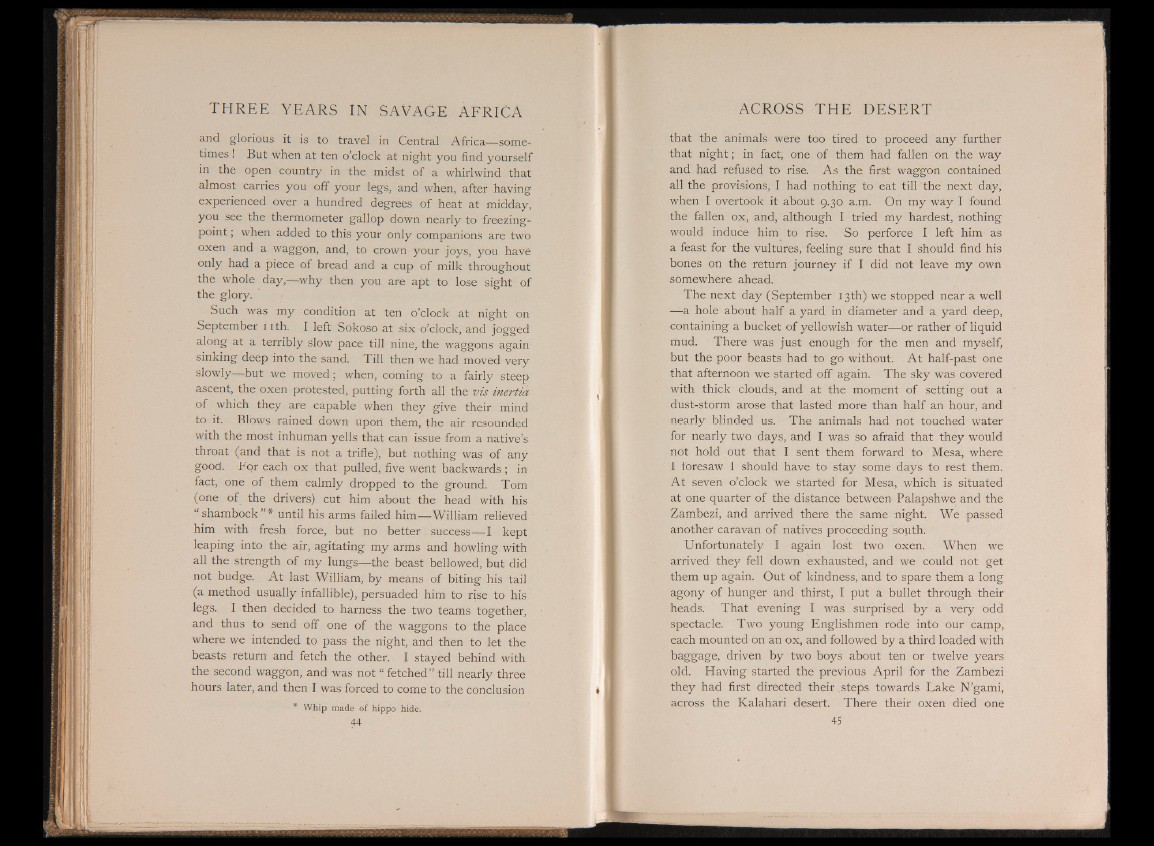
and glorious it is to travel in Central Africa—sometimes
! But when at ten o’clock at night you find yourself
in the open country in the midst of a whirlwind that
almost carries you off your legs, and when, after having
experienced over a hundred degrees of heat at midday,
you see the thermometer gallop down nearly to freezing-
point ; when added to this your only companions are two
oxen and a waggon, and, to crown your joys, you have
only had a piece of bread and a cup of milk throughout
the whole day,—why then you are apt to lose sight of
the glory.
Such was my condition at ten o’clock at night on
September i ith. I left Sokoso at six o’clock, and jogged
along at a terribly slow pace till nine, the waggons again
sinking deep into the sand. Till then we had moved very
slowly-^sbut we moved; when, coming to a fairly steep
ascent, the oxen protested, putting forth all the vis inertia
of which they are capable when they give their mind
to it. Blows rained down upon them, the air resounded
with the most inhuman yells that can issue from a native’s
throat (and that is not a trifle), but nothing was of any
good. For each ox that pulled, five went backwards ; in
fact, one of them calmly dropped to the ground. Tom
(one of the drivers) cut him about the head with his
“ shambock ” * until his arms failed him—William relieved
him with fresh force, but no better success-|| I kept
leaping into the air, agitating my arms and howling with
all the strength of my lungs—the beast bellowed, but did
not budge. At last William, by means of biting his tail
(a method usually infallible), persuaded him to rise to his
legs. I then decided to harness the two teams together,
and thus to send off one of the waggons to the place
where we intended to pass the night, and then to let the
beasts return and fetch the other. I stayed behind with
the second waggon, and was not “ fetched” till nearly three
hours later, and then I was forced to come to the conclusion
* Whip made of hippo hide.
44
that the animals were too tired to proceed any further
that night; in fact, one of them had fallen on the way
and had refused to rise. As the first waggon contained
all the provisions, I had nothing to eat till the next day,
when I overtook it about 9.30 a.m. On my way I found
the fallen ox, and, although I tried my hardest, nothing
would induce him to rise. So perforce I left him as
a feast for the vultures, feeling sure that I should find his
bones on the return journey if I did not leave my own
somewhere ahead.
The next day (September 13th) we stopped near a well
—a hole about half a yard in diameter and a yard deep,
containing a bucket of yellowish water—or rather of liquid
mud. There was just enough for the men and myself,
but the poor beasts had to go without. At half-past one
that afternoon we started off again. The sky was covered
with thick clouds, and at the moment of setting out a
dust-storm arose that lasted more than half an hour, and
nearly blinded us. The animals had not touched water
for nearly two days, and I was so afraid that they would
not hold out that I sent them forward to Mesa, where
I foresaw I should have to stay some days to rest them.
At seven o’clock we started for Mesa, which is situated
at one quarter of the distance between Palapshwe and the
Zambezi, and arrived there the same night. We passed
another caravan of natives proceeding south.
Unfortunately I again lost two oxen. When we
arrived they fell down exhausted, and we could not get
them up again. Out of kindness, and to spare them a long
agony of hunger and thirst, I put a bullet through their
heads. That evening I was surprised by a very odd
spectacle. Two young Englishmen rode into our camp,
each mounted on an ox, and followed by a third loaded with
baggage, driven by two boys about ten or twelve years
old. Having started the previous April for the Zambezi
they had first directed their steps towards Lake N’gami,
across the Kalahari desert. There their oxen died one